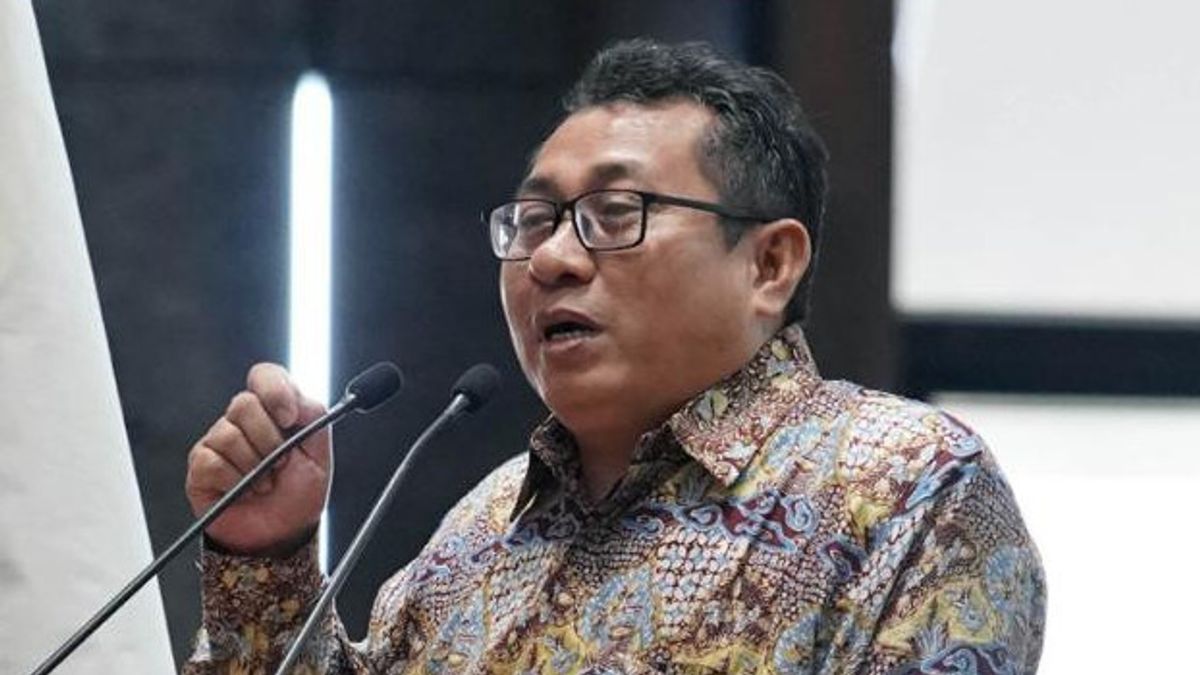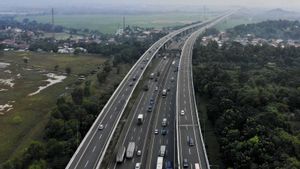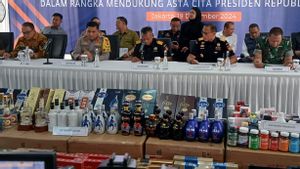JAKARTA - The DPR RI ratified the RKUHP into law in a plenary meeting which took place at the DPR RI Building, Tuesday, December 6. The ratification of the RKUHP was assessed by the Indonesian Cyber Media Union (SMSI) which seemed forced to be enacted. SMSI, which consists of around 2000 cyber press companies, will sue the ratification of the Criminal Code through the Constitutional Court (MK).
SMSI through its General Chair said, what is the rush to ratify, while socialization to the public has not been maximized, and the amount of input from various elements of society, especially the Press Council and its constituents, which have not been accommodated.
"This seems forced, ratification of the RKUHP. SMSI is worried that the existing articles still threaten human rights violations, press and democratic independence. Several articles, we also value the potential to criminalize journalistic works and violate press freedom," said SMSI Chairman Firdaus accompanied by the Head of Legal, Arbitration and Legislation Division Makali Kumar SH in a press statement, Thursday, December 8, 2022.
Although not in detail citing articles per article, SMSI is worried that there are still many articles in the newly revised Criminal Code, contrary to basic principles of human rights, press freedom and democracy.
Among them are the right to equality before the same law and legal protection without discrimination, the right to privacy and the right to freedom of religion or belief, as well as freedom of opinion and expression. In principle, SMSI supports criminal law reformation. However, the spirit of codification and decolonialization in the Criminal Code should not contain criminalization and reduce people's rights, including press freedom," explained Firdaus.
SMSI regretted the DPR's decision with the government, which seemed to force it to be determined immediately. The people's representatives are considered to ignore the participation and input of the community, especially the press community.
The Criminal Code Law, which was recently passed, is considered not through transparent, thorough, and participatory discussions. The government and the DPR do not accommodate various inputs and ideas from the public. Including from the press community.
Many crucial articles pose a threat to the press and journalists. SMSI through the legal field, from the beginning criticized the Criminal Code Bill. In fact, we are active with other constituents in the Press Council, to make various efforts in responding to the Criminal Code Bill. So that the crucial articles are revised, so as not to conflict with human rights or Law Number 40 of 1999 concerning the press," he added.
SMSI agreed to continue to fight together with the Press Council and other constituents, including elements of society outside the press community, in responding to the ratification of the Criminal Code Law, in the future. Including filing a lawsuit to the Constitutional Court (MK).
Many of the articles in the Criminal Code really threaten human rights and democratic life in Indonesia. Press freedom and freedom of expression are now facing silencing efforts.
The press as a pillar of democracy who works to fulfill the people's right to information which means that it will be paralyzed because it is faced with the threat of criminalization by articles of the Criminal Code Law.
In democracy, press independence must be maintained, one of which is by ensuring the absence of criminalization against journalists. This protection is needed so that journalists can be free to carry out their duties in supervising (social control), criticizing, correcting, and providing suggestions on matters related to the public interest to prevent abuse of power.
The press release is pending because the Criminal Code Law can ensnare journalists and press companies as perpetrators of criminal acts when carrying out journalistic duties.
The Press Council itself, as an independent institution, has previously compiled a RKUHP Problem Inventory List (DIM) on crucial articles that pose a threat to the press and journalists.
The Press Council also suggested reformulation of 11 clusters and 17 articles in the RKUHP that have the potential to threaten press independence, as an effort to prevent criminalization. However, the input that has been submitted to the government and the DPR does not receive feedback. In fact, the Press Council also conveyed suggestions for a case simulation to be carried out on the norms to be formulated.
The press criminal provisions in the Criminal Code injure the regulations that have been regulated in Law No. 40 of 1999 concerning the Press. Whereas the important element of democracy is the existence of freedom of expression, freedom of opinion, and press freedom.
In a democratic life, independence conveys thoughts and opinions in accordance with conscience and the right to obtain information, which is the right of human rights.
Seperti pasal 263 dan 264 RKUHP yang sudah diserahkan. Terindanya ada kata broadcastingan dan berita. Frasa ini akan berpotensi menghambat kebebasan pers. SMSI dari awal, minta untuk dihapus atau dihilangkan dalam RKUHP, karena hal itu sudah diatur dalam UU no 40 tahun tentang pers, tegas Firdaus.
SMSI noted articles on the Criminal Code which have the potential to criminalize journalists and threaten press freedom, freedom of opinion, and expression, as follows:
1. Development of Communistism/Marxism-Leninism-Article 188 which regulates criminal acts of spreading or developing Communist teachings/Marxism-Leninism.
2. An attack on honor or dignity of the President and Vice President - Article 218, Article 219, and Article 220 which regulates the criminal act of assaulting the honor or dignity of the President and Vice President.
3. Disrupt the Government and State Institutions- Article 240 and Article 241 which regulate criminal acts of insult to the government and state institutions are sentenced to three years.
4. Broadcasting or spreading of news or false notifications- Article 263 which regulates the crime of broadcasting or spreading false news or notifications.- Article 264 which regulates criminal acts against anyone who broadcasts uncertain, excessive, or incomplete news.
5. Disorders and irregularities in the judicial process- Article 280 which regulates disturbances and irregularities in the judicial process.
6. Criminal acts against religion and beliefs - Article 300, Article 301, and Article 302 which contain criminal acts against religion and belief.
7. Extortion and defamation of Good name - Article 436 which regulates criminal acts of minor insults.- Article 433 regulates criminal acts of pollution.- Article 439 regulates the crime of defamation of the dead.
8. Issuance and printing- Article 524 and Article 595 regulate criminal acts of issuance and printing.
Those are the articles in the new Criminal Code that have the potential to criminalize journalists and threaten press freedom, freedom of opinion, and expression.
The English, Chinese, Japanese, Arabic, and French versions are automatically generated by the AI. So there may still be inaccuracies in translating, please always see Indonesian as our main language. (system supported by DigitalSiber.id)













